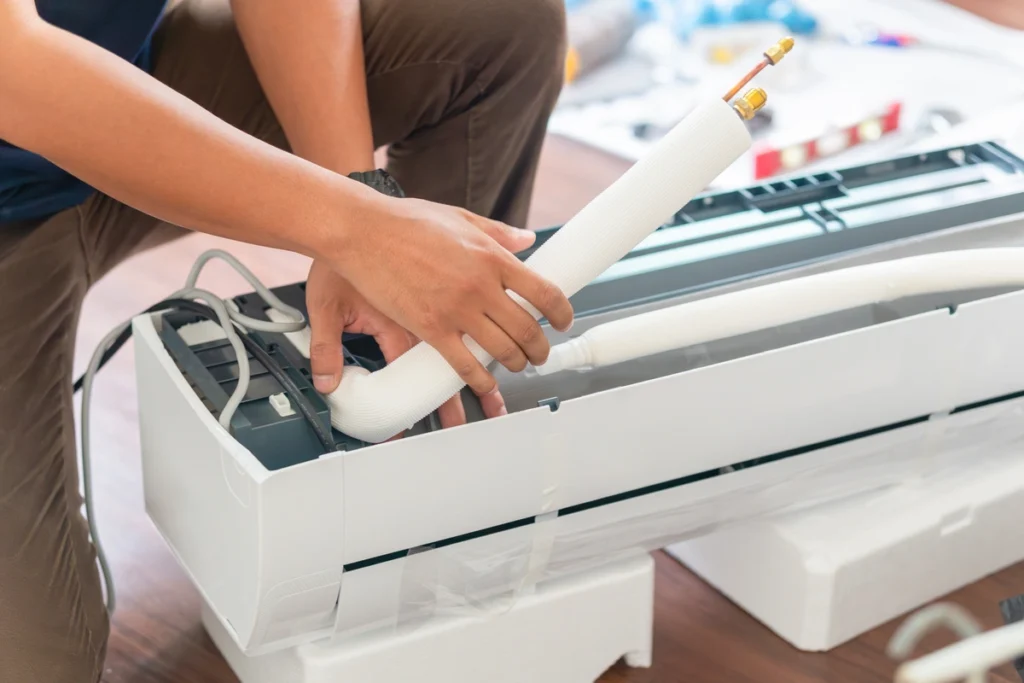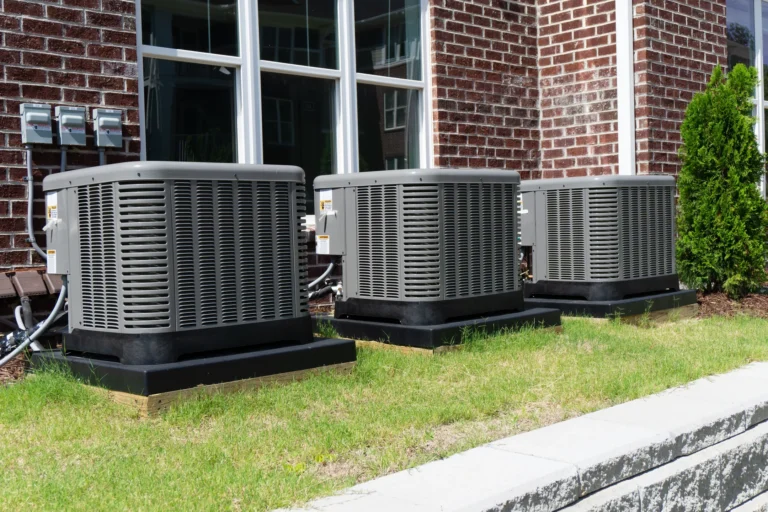
12 Kinds Of Air Conditioner Noise & How To Fix Them
An air conditioner (AC) is a modern marvel that brings comfort during sweltering summers. However, when your AC starts making unusual noises, it can be more than just an annoyance—it can signal underlying issues that need addressing. In this blog, we’ll explore twelve common types of air conditioner noise, what they might indicate, and how you can fix them, including:
- Hissing noise
- Banging noise
- Clicking noise
- Buzzing noise
- Squealing noise
- Rattling noise
- Whistling noise
- Thumping noise
- Popping noise
- Humming noise
- Screeching noise
- Dripping sound
- Preventative maintenance tips
INTRODUCTION TO AIR CONDITIONERS

Air conditioners have become a staple in homes and businesses, providing much-needed relief and efficient cooling during the hottest months of the year. A reliable air conditioning system not only keeps your indoor environment cool and comfortable but also helps maintain healthy air quality. However, even the best air conditioners can sometimes develop issues that lead to unexpected noises, like loud humming noises, buzzing sounds, or other weird noises that disrupt your peace. These air conditioner noises are more than just a nuisance; they can be early warning signs of potential issues within your system. In this article, we’ll break down the most common air conditioner noises, what they mean, and how you can fix them. Additionally, we’ll emphasize the importance of regular HVAC services and maintenance to ensure your air conditioning system operates smoothly, quietly, and efficiently throughout the entire season.
AC Noise Types and Solutions
| Noise Type | Common Causes | Recommended Action |
|---|---|---|
| Hissing | Refrigerant leak | Call a certified HVAC technician |
| Banging | Loose or broken compressor parts | Turn off AC and inspect for loose components |
| Buzzing | Electrical issues, loose parts, debris | Tighten connections, clean unit |
| Rattling | Loose components, debris, damaged fan | Secure parts, remove debris |
| Clicking | Thermostat issues, failing relay | Check thermostat, inspect electrical components |
| Screaming | High refrigerant pressure, compressor failure | Immediate professional service |
👂 12 Kinds of Air Conditioner Noises
Air conditioner noises can be more than just an annoyance; they often indicate underlying issues that need attention. Understanding the different sounds your AC might make and knowing how to address them can help you maintain an efficient and quiet system. Here, we identify 12 common air conditioner noises and provide practical solutions to fix them.
1. Hissing Noise
Cause: A hissing sound often indicates a refrigerant leak, which can affect your AC’s cooling efficiency.
Fix:
- Inspect and Identify: Check for visible signs of leakage.
- Professional Repair: Due to the complexity and danger of handling refrigerants, it’s best to call a certified HVAC technician to locate and fix the leak.
2. Banging Noise
Cause: A banging noise typically points to a loose or broken part inside the compressor. It can also indicate that the indoor blower is unbalanced.
Fix:
- Turn Off the AC: Immediately switch off your unit to prevent further damage.
- Inspect and Secure: Check for loose components and inspect the fan blades for any damage or looseness. Secure or replace as needed.
- Call a Technician: If the issue persists, professional help is required to inspect the compressor and other internal parts.
3. Clicking Noise
Cause: Clicking sounds can be a normal part of your AC’s operation when it starts up or shuts down. However, persistent clicking might indicate a failing thermostat or a defective control board.
Fix:
- Thermostat Check: Inspect the thermostat for loose wires or replace it if it’s old.
- Control Board Inspection: For control board issues, professional diagnostics and repair are necessary.
4. Buzzing Noise

Cause: Buzzing can result from various issues such as loose parts, debris in the unit, or electrical problems.
Fix:
- Clean the Unit: Remove any debris around the outdoor unit.
- Inspect for Loose Parts: Tighten any loose screws or components.
- Electrical Inspection: If the buzzing persists, contact a technician to check for electrical issues.
5. Squealing Noise
Cause: Squealing noises often come from the blower motor or fan, especially if the unit is older.
Fix:
- Lubricate the Motor: Applying lubricant to the motor can reduce noise.
- Replace the Belt: If the noise is due to a worn-out belt, replacing it can resolve the issue.
- Professional Check: For persistent squealing, have a technician examine the motor and fan.
6. Rattling Noise
Cause: Rattling sounds can be due to loose screws, bolts, or other parts that have come loose over time. Additionally, dirt or debris inside the unit can cause rattling noises by obstructing moving parts.
Fix:
- Tighten Loose Parts: Check and tighten any loose components.
- Inspect Ductwork: Ensure that the ductwork is properly secured and not vibrating.
- Call a Professional: If you can’t identify the source, professional help may be needed to find and fix the problem.
7. Whistling Noise
Cause: Whistling noises often indicate restricted airflow, which can be caused by clogged filters or ducts.
Fix:
- Replace Filters: Ensure that your air filters are clean and replaced regularly.
- Check Ducts: Inspect the ductwork for blockages or leaks and clean or seal as needed.
8. Thumping Noise
Cause: Thumping sounds typically indicate a misaligned or unbalanced blower wheel.
Fix:
- Turn Off the Unit: Prevent further damage by switching off the AC.
- Inspect the Blower Wheel: Check the alignment and balance of the blower wheel and adjust or replace it as necessary.
- Seek Professional Help: For complex adjustments, a technician’s expertise may be required.
9. Popping Noise
Cause: Popping sounds are usually related to thermal expansion and contraction in the ductwork.
Fix:
Inspect Ducts: Ensure the ductwork is properly insulated and secured.
Professional Adjustment: A professional can adjust and secure the ductwork to minimize noise from thermal expansion.
10. Humming Noise
Cause: A low humming sound is often normal, but loud humming can indicate electrical issues or problems with the fan or motor.
Fix:
- Check Electrical Connections: Ensure all electrical connections are secure.
- Inspect the Fan and Motor: Clean and lubricate the fan and motor if needed.
- Professional Diagnosis: For persistent humming, a technician should inspect for electrical problems or failing components.
11. Screeching Noise
Cause: Screeching noises are often caused by a malfunctioning fan motor or issues with the blower wheel. Worn or malfunctioning motors, especially in energy-efficient air conditioning systems, can also lead to screeching sounds.
Fix:
- Turn Off the AC: To prevent damage, switch off your unit.
- Lubricate or Replace the Motor: Lubricate the motor bearings or replace the motor if necessary.
- Inspect the Blower Wheel: Check the blower wheel for damage and replace it if needed.
12. Dripping Sound
Cause: A dripping noise typically indicates a blocked or broken condensate drain line, leading to water buildup.
Fix:
- Clean the Drain Line: Use a wet/dry vacuum to clear the blockage from the condensate drain line.
- Inspect for Leaks: Check for any leaks or damage to the drain line and repair them.
- Professional Cleaning: If you can’t resolve the issue, a technician can provide thorough cleaning and repairs.
BLOWER FAN ISSUES: A COMMON NOISE CULPRIT

The blower fan is at the heart of your air conditioning system, working tirelessly to circulate cool air throughout your house. But when something goes wrong with the blower fan, it can quickly create noise and disrupt the comfort of your home. Common culprits include loose screws, debris inside the fan, or worn-out motor bearings—all of which can cause rattling, squealing, or grinding sounds. To address these issues, always start by turning off your air conditioner for safety. Next, inspect the fan blades for any debris inside or signs of damage, and check the motor for wear. Tightening loose screws and cleaning the fan blades can often resolve minor issues, while replacing worn-out motor bearings may be necessary for persistent noise. Don’t forget to check your air filter as well—a dirty air filter can restrict airflow, forcing the blower fan to work harder and create noise. Regularly replacing the air filter not only helps reduce noise but also improves air quality and keeps your cooling system running efficiently.
AIR CONDITIONERS AND NOISE REDUCTION
While air conditioners are engineered to operate quietly, it’s not uncommon for an ac unit to develop loud noises over time. Buzzing noises, squealing noise, banging noise, and hissing noise are just a few examples of sounds that can signal something is amiss with your air conditioning system. These noises often result from loose parts, a dirty air filter, or problems with the fan motor or compressor. To keep your air conditioner running efficiently and minimize disruptive sounds, it’s important to address these issues promptly. Start by regularly cleaning or replacing the air filter, tightening any loose screws, and inspecting the ductwork for gaps or vibrations. If your system continues to create noise, consider using a sound blanket around the compressor or upgrading to a new thermostat for better control. By staying proactive with maintenance and quickly addressing any unusual noises, you can enjoy efficient cooling and a quieter, more comfortable home environment.
DIY Tips for Reducing AC Noise
While some noises require professional attention, there are steps you can take to minimize everyday AC noise.
- Regular Maintenance: Clean or replace air filters monthly to ensure optimal airflow and reduce strain on the system.
- Tighten Loose Parts: Periodically check and tighten screws and bolts on your AC unit to prevent rattling noises.
- Install a Sound Blanket: For outdoor units, consider installing a compressor sound blanket to dampen noise.
- Use Vibration Pads: Place anti-vibration pads under the AC unit to absorb vibrations and reduce noise transmission.
💡 Preventative Maintenance Tips
To prevent these noises and keep your AC running smoothly, regular maintenance is crucial. Here are some tips:
- Change Filters Regularly: Replace air filters every 1-3 months, depending on usage and air quality.
- Clean the Unit: Keep the outdoor unit free of debris and ensure the indoor unit is dust-free.
- Check Refrigerant Levels: Ensure the refrigerant is at the correct level and have it topped up by a professional if needed.
- Inspect Ductwork: Regularly inspect and clean your ductwork to prevent blockages and leaks.
- Schedule Professional Maintenance: Have a professional technician inspect and service your AC annually to catch and fix issues early.
- For complex repairs, always call a licensed technician to ensure safety and proper system functioning.
Addressing a common issue early can prevent costly repairs down the line. Make sure any problems are fixed promptly to avoid further damage to your cooling system.
🙌 Why Trust Bob’s AC for Your Air Conditioning Needs
Understanding the various noises your air conditioner can make is the first step toward diagnosing and fixing the problem. At Bob’s AC, our experienced technicians are skilled in identifying and resolving these issues, whether they require simple DIY fixes or professional intervention. Our team is dedicated to providing regular maintenance and prompt attention to unusual noises, ensuring your AC operates efficiently and quietly, delivering comfort during hot weather. Trusting Bob’s AC means you can avoid costly repairs, extend the lifespan of your unit, and experience the peace of mind that comes with expert service!
Reach out to us now to schedule a consultation or maintenance service. Don’t let minor issues turn into major problems—Bob’s AC is here to help!
Ultimate Comfort Awaits


